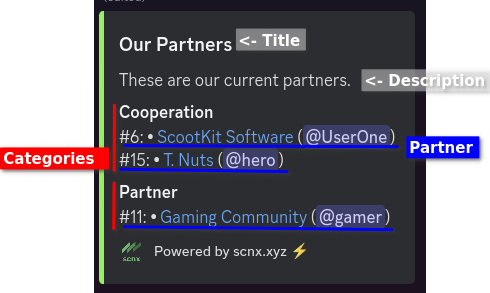Partner-List
Manage your partnerships with other guilds easily.
Features
This module is designed to make managing partnerships with other Discord servers easy.
- Create an always up-to-date embed listing all your current partners.
- Create custom categories to keep your partners sorted.
- Automatically assign and remove roles from partners.
- Automatically send notifications to your partner about changes in their status.
Here's an example of a partner-list (you can customize appearance):

Setup
- Please set up permissions for Slash-Commands to avoid unauthorized usage of them.
- Then, configure the partner-list:
- Create a channel in which the bot should send the partner-list. The bot has to have the "View channel", "View message history" and "Send message" permissions on it.
- Open the Module configuration and configure the module.
- Reload the configuration of your bot to apply changes - the bot will send a partner-list automatically.
Usage
- To add a new partner, use
/partner add. - To edit a partner, use
/partner edit. - To delete a partner, use
/partner delete. - The Partner-List will be updated automatically to reflect changes, no manual action needed.
Commands
name:<Type> is an option of a slash-command with name name and the type Type. Options that not required, are described as [name:<Type>]. If the action of a command is vastly different between required and not-required options, we might list them separately.Examples
/moderate ban user:<Member>: This command (/moderate ban) has an required option with the name "user" that only accepts one member as a value./moderate ban victim:<Member> reason:<Text>: This command (/moderate ban) has an required option with the name "victim" that only accepts one member as a value and another required option with the name "reason" that accepts any text as an value./moderate ban victim:<Member> reason:<Text> [proof:<Attachment>]: This command (/moderate ban) has an required option with the name "victim" that only accepts one member as a value, another required option with the name "reason" that accepts any text as an value and a not-required option with the name "proof" which allows one attachment as its value.
| Command | Description |
|---|---|
/partner add name:<Text> category:<Category> owner:<Member> invite-url:<Text> | Creates a new partner. You can enter any text as the name of the partner and link any URL as an Invite-URL and select a category from the configured categories. If enabled, this will send a message to the partner. |
/partner edit id:<PartnerID> [name:<Text>] [category:<Category>] [owner:<Member>] [invite-url:<Text>] [staff:<Member>] | Edits an existing partner. You can update the name, Invite-URL, Owner, Category and the assigned Staff-Member - only options you specify will be updated. You can either enter an ID of an existing partner or use auto-complete to select the correct partner. |
/partner delete id:<PartnerID> | Deletes an existing partner. You can either enter an ID of an existing partner or use auto-complete to select the correct partner. Deleted partners can't be restored. |
Configuration
This configuration file allows you to set up notification-messages to partner, edit the partner-list-embed and more. Open it in your dashboard.
| Field | Description |
|---|---|
| Channel | This is the channel in which the Partner-List will be sent. If the bot had already sent a message in the past, the old partner list message in that channel will be edited. |
| Partner-List-Embed | This is the configuration of the partner-list. |
| Partner-List-Embed: title | Title of the Partner-List-Embed. |
| Partner-List-Embed: description | Description of the Partner-List-Embed. |
| Partner-List-Embed: partner-string | This is the format of a partner displayed in the Partner-List-Embed. You can find availible parameters in the Dashboard. |
| Partner-List-Embed: color | This will be the color of the Partner-List-Embed. |
| Categories | These are the categories that partners can be assigned to. Each category needs to be unique. Only these categories can be selected via commands. |
| Category-Roles | These are the roles that will get assigned to new partners and removed from deleted partners. First field: Category-Name (case-sensitive) Second field: ID of the role |
| Send Partner-Notifications | If enabled, partners will be sent a message when they get added or removed. |
| Partner-Welcome-DM | Only visible if "Send Partner-Notifications" is enabled. This message will get send to partners when they get added. |
| Partner-Removal-DM | Only visible if "Send Partner-Notifications" is enabled. This message will get send to partners when they get removed. |
Troubleshooting
The Partner-List is not appearing in the configured channel or not updating correctly.
- Make sure bot has "View channel", "Send messages" and "View message history" permissions on the channel.
- Make sure non of your category fields are empty.
- Restart your bot.
Can I restart the ID counter?
No. The ID is an unique identification number and can not be reset. This is a technical limitation - you can remove the %id% parameter from your "partner-string" under "Partner-List-Embed" in your module configuration or replace it with the %nr% parameter, which automatically updates the numbers.
Stored data
The following data is being stored about every partner created via commands:
- An unique integer identifying the database entry
- The Invite-Link specified for this partner
- The User-ID of the staff-member creating the partner entry
- The specified name of the partner
- The specified category of the partner
- Metadata about the entry (date when created and last updated)
To delete stored data, use /partner delete
or purge the module database.
